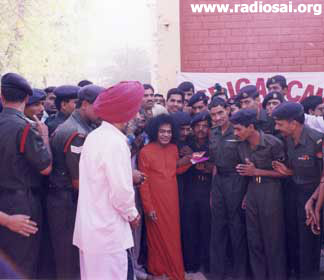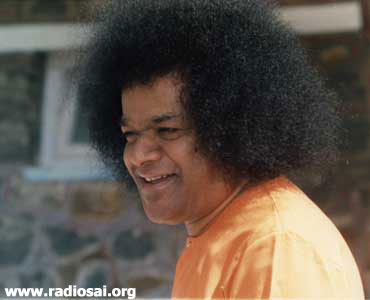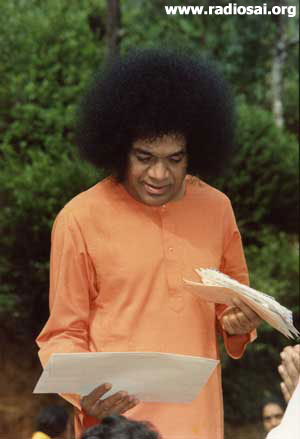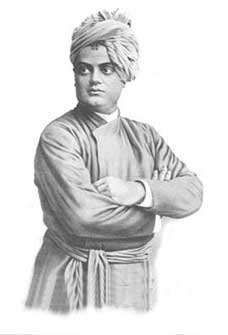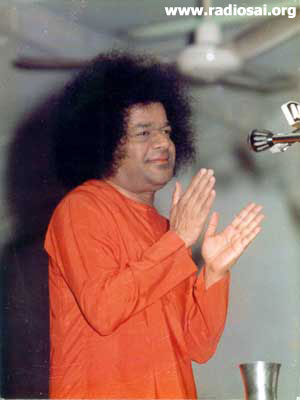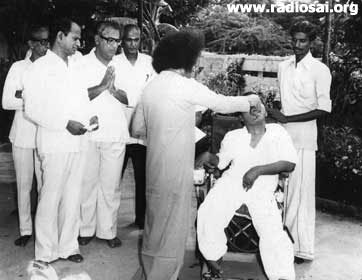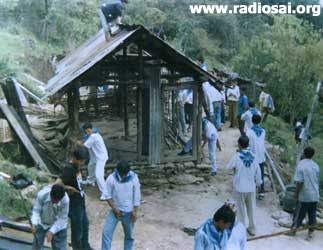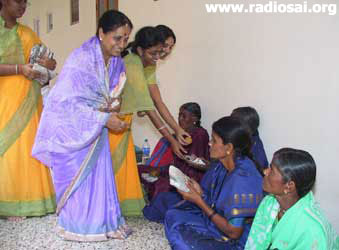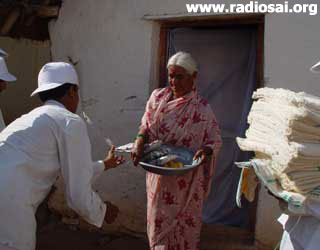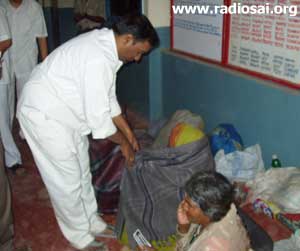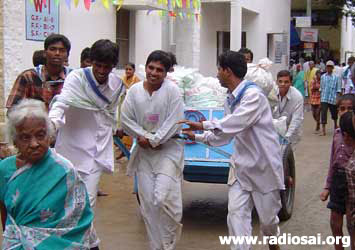 |
 |
 |
 |
| Volume 4 - Issue 11 NOVEMBER 2006 |
|
“HANDS THAT SERVE ARE HOLIER THAN LIPS THAT PRAY” - An enlightening panel discussion, Part 2 This is the second part of the panel discussion held in the Brindavan campus of Swami’s Institute during the “Summer Course on Indian Culture and Spirituality” in May 2002. In the October issue, we had the first part of this riveting discussion. To read that again, click here. We continue from where we stopped in the previous issue.
Sri Sanjay Sahani: When we finish our education and join various organizations, many students have reported that at least initially they have very little time to do service activities. When you are a fresher in an organization, a lot of work is thrust on you. In such a circumstance, how do we participate in service activities? In this context, this particular issue is relevant. Whatever is your duty, if you do it with all your heart and you do it as your offering to God, He will receive it and He will recognize it and He will appreciate it. I am reminded of a personal experience, in this context. One of our students was very weak in a particular subject. The first examination results were out, he had not done well and the report went to his father and the father was naturally worried. He had a chance to meet Swami and he expressed his concern to Swami. “Swami, my son is very weak in such and such subject.” Swami said there is a teacher in that college who is teaching this particular subject that he will take care, there is nothing to worry about. The father told his son to go and tell the teacher that this is what Swami has said. Now what the teacher was teaching was a pure academic subject, there was nothing spiritual about it. Obviously the attitude with which he was doing that work had caught the attention of Bhagavan and at an opportune moment He let it be known to that individual also that He had recognized it. If work is to be transformed into worship, it can happen only as Swami said, “Do your duty sincerely.” There is no point in going outside and doing seva when in your own house you don’t do service to your own children or in the organization where you are your proper duty is not discharged to the best of your capacity. This is an aspect of service which we should not ignore. Thank you, sir. Prof. GV: This is an important point, where social implications are not properly understood by most people including us. If people do their duty as they are supposed to do, half the problems would just disappear. Without spending a single extra paisa or borrowing from this bank or that bank, discharging the obligations, responsibilities is very important. Prof. Kumar: This is an episode described by Bhagavan during His earlier discourses. Hanuman was instrumental in bringing Rama and Sita together. When he started right from the mountaintop, Hanuman was warming up taking three jumps. He was just warming himself up, as cricketers do before the match. Three jumps: what do they stand for? One jump indicates determination, the second jump declaration, the third jump start off. Harmony in thought, word and deed.
“Appa, Emi nadisthunnarayya, Emi Natakamayya.” – “How nicely you are acting.” “Enu Swami Ala antaru?” – “Why do you say that?” “Nenu Osthunnanu, Nanu Aduthunnananu…Natakamanthena?” – “You are acting because I will be coming? It is not acting?...No!” Service is not action – service is reality. That was a hard lesson. I will also tell one more incident.
Prof. Ramamurthy: Doing your duty is service, I don’t deny it. However, there are occasions when you have the options and opportunities to go beyond it. I remember my days when I was not a Sai devotee and I was engaged in teaching professional courses. If the boys do not pass in the first year, then they are left to themselves, no further instructions are given to them and they have to manage on their own. I requested the authorities to provide accommodation so that their classes could be organized and revisions could be organized. They said “No, accommodation is not available.” I went to another school and got the headmaster to provide accommodation and had free classes for them. A thought came that these are the ones who are left out. They don’t have a second chance of hearing and revising the lessons. We must provide them an opportunity. I was going beyond to what I am committed to do. Small industrialists were there and we formed a small industrialists' management association so that they could be taught how to manage their affairs in finance and other areas, without fee; the programs were organized for them. This came spontaneously because by looking outside we have the means and we can provide the necessary assistance. When such opportunities come, we must grab them, meaning going beyond the committed duty of the job you have in the profession you have chosen. There may be many such opportunities and other avenues. If you have the capability and skill, take those opportunities, and if you can, go beyond the committed duty for which you are earning a salary. A Seeker of Liberation Must Serve
Sri Sanjay Sahani: It is said Paropa kaarartham, idham shariram – The body is given only to serve others. Swami Vivekananda used to say, “If you cannot think of the world, at least think about your country; if you cannot think about your country, at least think about your community; if you cannot think about your community, at least think about your family; but for heaven’s sake do not think about yourself.” There is a famous saying that Swami often quotes: “Na thapamsi na theerthani,” – Not by penance, nor by pilgrimage – “na shastram japa nahi” – not by the study of scriptures, nor by continuous chanting – “samsara sagarothare sajjanam, sevanam bina” – if you have the aspiration to cross the ocean of worldly existence, if you are a mumukshu – seeker of liberation – then you must serve. Sajjana – Who is a sajjana? It is the good people. One of the important duties of the students was to serve the Guru. Guru is the repository of the knowledge and wisdom. By serving him, they gained the knowledge of the Guru. There is a famous episode in Shankara’s life. There was a disciple named Padmapada. All his fellow classmates used to do lot of study but this boy had no inclination for study, his only aspiration was to serve the Guru. One day he had taken the clothes of his Guru and gone to the river to wash them. As luck would have it, the river suddenly started overflowing and he was surrounded by the waters. The Guru heard that the river was in spate and he called out to his disciple “Padmapada!” He was worried about him. When Padmapada heard the call, he took his Guru’s clothes on his head and started walking on the water. Wherever he put his step, there emerged a stone lotus and he was able to cross the river and reach the presence of the Guru.
“If service is considered most important, then why in the Kali Yuga is namasmarana [repeating the Name of the Lord] said to be the path for liberation and not service?” This is a tough one, handle it.
So service and sankeertana [singing the glory of the Lord] are not separate. Service and sankeertana go together. Pumping of the heart and breathing of the lungs go together, so also service and sankeertana go together. That is the answer to this question. The Bliss of Service Prof. GV: Thank you, thank you. There is no need to separate the heart from the lungs. Now, over to Sanjay. I am posing this question to you as it relates to something you said earlier. “What confidence do you have that the bliss which you enjoy while serving is the bliss of the God and not the bliss of your own momentary joy?”
Prof. GV: Thank you. Would you like to say something about it, Prof. Kumar? Prof. Kumar: While in agreement with what Sri Sahani has said, I would like to add a simple supplement. Momentary joy – how do you know that? Momentary joy is born out of selfishness. That which is selfish gives you momentary joy. When you are selfless, that gives you bliss. Prof. GV: Wonderful clarification. The point he is making is that which relates to the body and the world is ephemeral. It is momentary. Bliss is not like that. Even if it has passed, when you recall, you will experience the same bliss. Swami smiled at me ten years ago, and when I remember that I am happy now. I ate a mysoorpak ten years ago, it was very nice then but does not give me the same joy now. There is a real difference, it is not trivial. Now to you Professor Ramamurthy. “Define prayer and service.”
Lord Krishna says, “I do service.” This is the role model that others should follow. So service to man can also evolve as a prayer. When you get the solution for others, solution comes for you also. That is what I would have to say. Charity Versus Service Prof. GV: In this explanation, you answered several questions that I have here. In the interest of time, I will take only “star questions” as they say in parliamentary language. This is a question for Sanjay Sahani. What is the difference between dhaana [charity] and service? Sri Sanjay Sahani: Generally there is a feeling that to do service, you need money. It is far from true. To illustrate this point, let me narrate an incident which was depicted the other day by one of the groups of students on the orientation programs. It is a real life incident. There is a youngster who was in Ahmedabad when the riots broke out. To his utter horror, people whom he had known for years, his friends, his neighbors, who he called uncles, who were well-to-do, who were well-educated, left the home and joined the mob. The mob is in a mad frenzy, in a killing spree. This youngster asked himself, “What should I do? What is my dharma?” The boy thought to himself, “First thing is not to join the mob. Individually they may be sane, but the mob as a whole has gone crazy. If I join the mob, I will lose my sanity. The minimum I can do is not to join the mob.” First principle of service: “If you cannot help anybody, at least do not harm them.” Second, he thought to himself, “I cannot prevent these riots from taking place, I cannot put out this raging fire that has swept our town. There are people who I know, who I have interacted with. Perhaps if I talk to them and convince them, at least those people will not resolve to arson.”
The gram [village] which is coming up next to Puttaparthy, Swami is setting aside funds for the education of those children who are going to be settled there. He does not want to put the money, thousands of rupees, in the hands of those people. No, He wants to put it in the banks. From the interest earned from the deposit, those children will be educated. Charity is something that is miniscule. Also, the motive is very important. If you are going down the road and a beggar is nagging you and you give him some money, you may be indulging in charity but you are not doing service. You are trying to get away from the nagging beggar which is a fundamental difference between charity and service, which you should really understand. Sai Ram. Prof. GV: Prof. Kumar, could you supplement please?
Prof. GV: Wonderful elucidation of the service and the Indian tradition. A minor underscore of what is said: When you give charity, you give material that belongs to you, when you do service, you share the bliss. Bliss is God’s property. Like Swami gives prasadam and we go and give it around, that is what we spread around during service. Why Help Others? – Our Debt to Society This question is for Prof. Ramamurthy. The student says it was put to him by a well-to-do person. “If I have got everything in my life, I have earned it through my hard work. Why should I help others?” This question has already been answered by Prof. Kumar. You are what you are because of the environment in which you have been allowed to come up. You might have put in your own effort, nobody denies it. The family that gives you full support, the neighborhood where the conditions were congenial. Society has facilitated. We require enormous facilities in terms of transportation, hospital, medical facilities, and so forth. Some agencies have made these things available for you. Society has facilitated your development. You might not be aware of it, but you must be conscious about it. There is something you have to give back to the society. Swami emphasizes this point very often. There is not a question of my claiming that what I have done is my own making. I am a self-made man, you may say. You can’t make yourself unless you are allowed to be made to the stature that you are by those around you and with you. Since the conditions have been made possible for you to develop, it is essential that you have to pay back. Prof. GV: Prof. Ramamurthy made a very important point: You are what you are because of the society. You just cannot write it away or wish it away. We don’t realize that. Sometime ago, I was reading in one of the magazines devoted to business and commerce a statement made by an executive at Microsoft. You all know Microsoft is a huge company headed by Bill Gates. This man said we cannot wish away the society. We are here because of the society. It is society that runs the universities and schools. It is society that builds the roads, it is society that constructs airports, provides transportation, power, utilities. But for that, where would Microsoft be? We have a duty to the society and therefore Microsoft does as well. I would now like to launch the landing formalities, because we have to wind up. I would like to start the closing formalities by requesting each of the panelists to give a one-minute summary of what transpired today. What is the message you wish us to carry home? Service Leads to Humility
Prof. GV: Thank you, sir. Sanjay made an important point. Prayer may not make me humble; on the other hand it may make me more egoistic. Service will certainly make you humble and destroy your ego. Prof. Kumar, now. Prof. Kumar: If you serve rich people, you are serving Lakshmi Narayana Seva; if you serve equals, you are serving Ashwatha Narayana Seva; if you serve poor people, it is Daridhra Narayana Seva. Narayana is common in all three. The very title of this session: “Hands that serve are holier than lips that pray.” If you don’t pray and if you merely serve it is karma, mechanical. If you serve with prayer, that is spiritual, karma yoga. Service and prayer should go hand in hand. “Na sankalpantho samasthamu chadinchagalanu Itivari oka prameyamu akharaledu Aiyna apadiki mee shakthi nimithami, mee bhakthi nimithamai Nee mukthi nimithamai seva bhagyam andhisthunanu Annaru Swami” Which means, “Swami says: with my mere will I can accomplish everything. But I give you this opportunity to serve for your own welfare, your liberation, your devotion.” For your mukthi (liberation), for your keerthi (reputation), service is an opportunity. Sai Ram. Prof. GV: Prof. Kumar pointed out that even bhakti can be acquired through service. Don’t think bhakti is a shortcut.
In our attempt to make the summer course as varied as possible and provide an opportunity for you to share your thoughts in a freer atmosphere and ask questions, we hit upon this idea of the panel discussion. Thanks to the extremely professional manner in which it was conducted, you were able to raise a large number of questions and share many insights which could not have been possible in a brief period of time. Collapsing all of them in such a short span of time has enormous significance. That is what has been gained. I would wholly go along with what was observed towards the end of the session: Pray with all your heart, serve with all your heart. There can be nothing better than this. Sai Ram. All Beings Serve and All Beings are Served Prof. GV: Sai Ram, sir, and thank you very much, we really feel encouraged by your comments. It is now my duty to bring the curtain down. The question of service is closely related to the 4th chapter of the Bhagavad Gita, where the Lord says this entire Universe is a cosmic gear chain. Everybody serves and everybody gets served. Don’t forget that. If God has created ants, it is for a purpose. The ant serves you, though you may not know it. If God has created the crow, the crow serves us. Before our scavenging system came, the crow was nature’s scavenger. Crow serves us. That is why our ancients were so considerate, they used to give milk to the snakes and feed the crows. This is an aspect of our culture which I would like you to go back to and think about. It is closely related to the profound observation of Bhagavan in the 4th chapter. So if we are talking about service, let us not forget there is a cosmic setting. Next point is related to the advocates of bhakti [devotion] who do not serve. Take for example, Shankara. Can you ever surpass the service that he did? Two thousand years ago, to go up and down across the country on foot to leave behind the legacy of the incredible treasures that will never get wiped out – is that not service? Yet, we never think of the karma yoga aspect of Shankara. Nobody can give that service to the soul. Very few people are privileged to give service to the soul; they are the ones who are remembered throughout history. That is why Prof. Ramamurthy said, even a gnani has a duty of establishing himself as a role model, and when that fails, God Himself comes down. And you are hearing every day from Bhagavan how he brought the entire drama troupe, not just Rama, not just Lakshmana, but even characters whose names you have not heard of. It is very important. One Can Always Do Service Lastly, you can always do service. A blind man can do service, a deaf person can do service, even a person on his deathbed can do service. You can say I have gone out of my wits, but no! There is a famous story from the Crimean War, I believe.
Keep your eyes open. Look at Swami. We had no time to discuss the way Swami teaches lessons on service. Open your eyes and see! Open your mind and observe! Open your heart and feel!
|
|||||||||||||||||||||||||||||||||||||||||
| You can write to us at : h2h@radiosai.org |
Vol 4 Issue 11 - NOVEMBER 2006
|
Best viewed in Internet Explorer - 1024 x 768 resolution. |
DHTML Menu by Milonic. |
